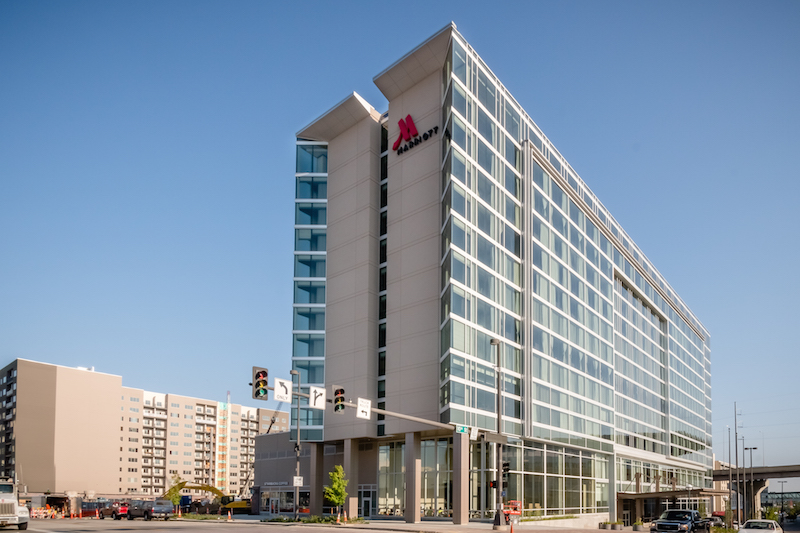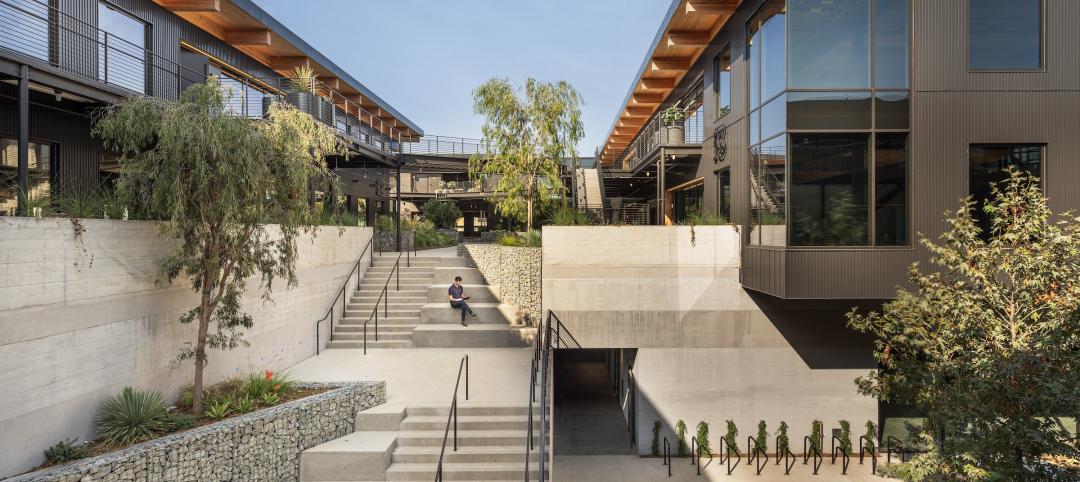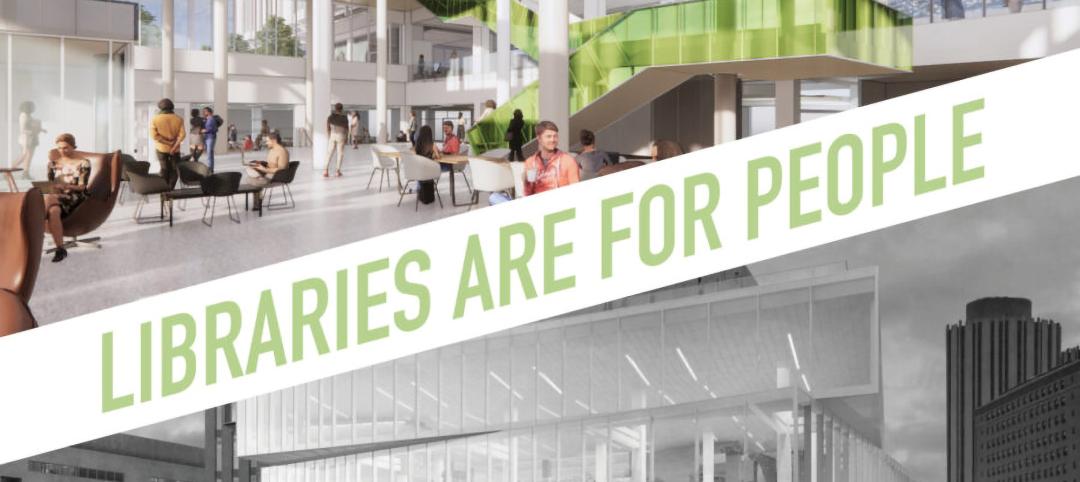Ken Martin, AIA, NCARB, has joined Leo A Daly to lead its Dallas office as Vice President and Managing Partner.
Most of Martin’s 25-plus-year career in design, planning, and management has focused on hospitality, which happens to be the Dallas office’s largest market. He joins Leo A Daly from DLR Group, where he was that firm’s hospitality and convention center expert. He reports to COO John Kraskiewicz.
Martin assumes his new post at a time when Leo A Daly has several large-scale hospitality-design projects in the works or just completed. These include the five-star 285-room Hotel Talisa in Vail, Colo.; the 582-room Ritz-Carlton Orlando Grande Lakes in Florida; and the 12-story 333-room Marriott Downtown Omaha in Nebraska, which opened last month as the first phase of that city’s entertainment Capitol District.
“Hospitality, I would argue, leads a lot of innovation,” says Martin in a video that Leo A Daly released to announce his hiring. “You cannot be reactive in this business.”
He praises his new employer as “one of the preeminent design firms in the hospitality industry,” and talks about the importance of sustainability and meeting guest expectations in hospitality design.
In a recent article he wrote for Hotel Business Review, Martin shared his thoughts about adaptive reuse as “a key piece of many [hotel] brands’ strategy,” and how authenticity in the redesign of existing buildings is “something of the Holy Grail.” On such projects, Martin said he asks the following questions to guide his teams’ designs: “What has that neighborhood been? Where is it going? Culturally, what are the drivers, and who are our local patrons going to be? What do they value? Who are the guests, why are they traveling to this city (or this neighborhood), and what are they looking for? That is to say: How do you integrate?”

Ken Martin was considering his professional legacy when, at 50, he switched firms. Image: Leo A Daly
Martin began his career as a museum exhibit designer for University of New Mexico, where he earned a bachelor’s degree in architecture. He spent nearly 27 years with DLR Group, rising to the level of Principal and National Hospitality Leader. One of the projects he was working on for DLR before he left was the renovation of the 16-story, 250-room Laylow Hotel by Marriott Autograph in Waikiki, Hawaii.
The 50-year-old Martin tells BD+C that several factors drove his decision to switch firms. For one thing, he and his wife are recent empty nesters, which gave them flexibility to relocate.
Martin was also giving more thought to his professional legacy. “I know there are is a finite number of projects I’ll get to do. So you start to ask yourself—blue sky—how can I make the biggest impact?”
He became aware that Leo A Daly was looking for a managing principal as Patricia Miller, its corporate director of hospitality, was moving into a global practice leader role for the firm. During the interview process, Martin was impressed with the projects that Leo A Daly was working on “that hint at a new level of design for the firm. This is a place where I can do signature work.”
He says that he brings a different approach to architectural programming and design, having been on the front end of DLR’s large conference center/hotel projects.
Leo A Daly is strong in the civic market. And there are other specialties across its 30 offices “that are begging to be infused with hospitality design and energy,” says Martin. The convention center/hotel sector is one of these; global healthcare and aviation are two others.
“Enlisting the strength of our hospitality teams in those projects and pursuits is a great avenue to doing great work,” says Martin.
Related Stories
Sustainability | Sep 18, 2024
3 living buildings made by a living practice
Prompting humans to reexamine our relationship to the environment, architecture creates the opportunity for us to physically experience ideas of beauty, performance, and structure through the distinct lens of place.
3D Printing | Sep 17, 2024
Alquist 3D and Walmart complete one of the nation’s largest free-standing, 3D-printed commercial structures
Walmart has completed one of the largest free-standing, 3D-printed commercial structures in the US. Alquist 3D printed the almost 8,000-sf, 20-foot-high addition to a Walmart store in Athens, Tenn. The expansion, which will be used for online pickup and delivery, is the first time Walmart has applied 3D printing technology at this scale.
Retail Centers | Sep 17, 2024
Thinking outside the big box (store)
For over a decade now, the talk of the mall industry has been largely focused on what developers can do to fill the voids left by a steady number of big box store closures. But what do you do when big box tenants stay put?
Government Buildings | Sep 17, 2024
OSHA’s proposed heat standard published in Federal Register
The Occupational Safety and Health Administration (OSHA) has published a proposed standard addressing heat illness in outdoor and indoor settings in the Federal Register. The proposed rule would require employers to evaluate workplaces and implement controls to mitigate exposure to heat through engineering and administrative controls, training, effective communication, and other measures.
Codes and Standards | Sep 17, 2024
New California building code encourages, but does not mandate heat pumps
New California homes are more likely to have all-electric appliances starting in 2026 after the state’s energy regulators approved new state building standards. The new building code will encourage installation of heat pumps without actually banning gas heating.
Mass Timber | Sep 17, 2024
Marina del Rey mixed-use development is L.A.’s largest mass timber project
An office-retail project in Marina del Rey is Los Angeles’ largest mass timber project to date. Encompassing about 3 acres, the 42XX campus consists of three low-rise buildings that seamlessly connect with exterior walkways and stairways. The development provides 151,000 sf of office space and 1,500 sf of retail space.
Education Facilities | Sep 16, 2024
Hot classrooms, playgrounds spur K-12 school districts to go beyond AC for cooling
With hotter weather occurring during the school year, school districts are turning to cooling strategies to complement air conditioning. Reflective playgrounds and roads, cool roofs and window films, shade structures and conversion of asphalt surfaces to a natural state are all being tried in various regions of the country.
Office Buildings | Sep 16, 2024
Maximizing office square footage through ‘agile planning’
Lauren Elliott, RID, NCIDQ, Director of Interior Design, Design Collaborative, shares tips for a designing with a popular and flexible workspace model: Agile planning.
3D Printing | Sep 13, 2024
Swiss researchers develop robotic additive manufacturing method that uses earth-based materials—and not cement
Researchers at ETH Zurich, a university in Switzerland, have developed a new robotic additive manufacturing method to help make the construction industry more sustainable. Unlike concrete 3D printing, the process does not require cement.
Libraries | Sep 12, 2024
How space supports programming changes at university libraries
GBBN Associate Sarah Kusuma Rubritz, AIA, uses the University of Pittsburgh's Hillman Library to showcase how libraries are transforming to support students’ needs.

















